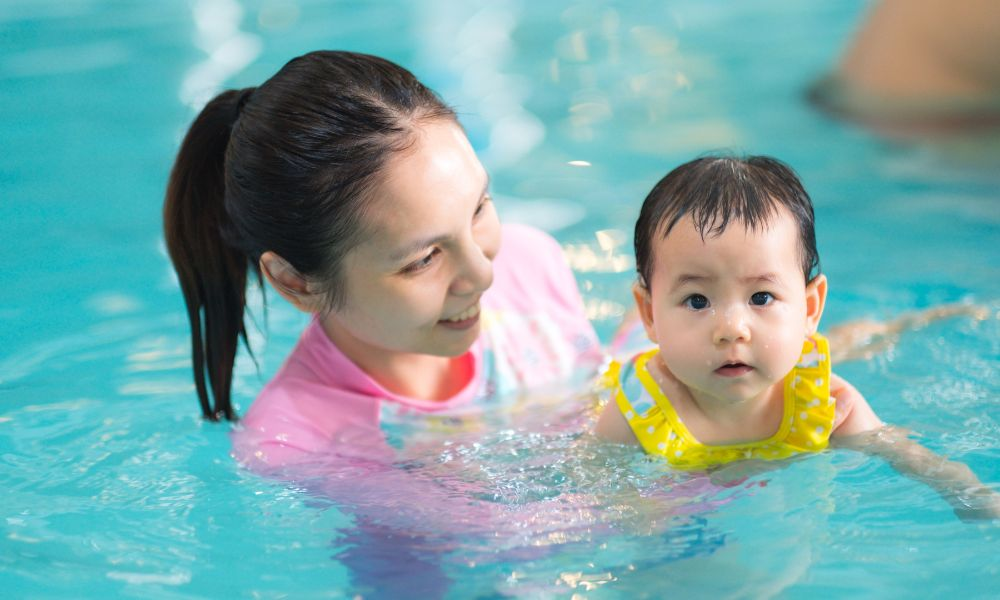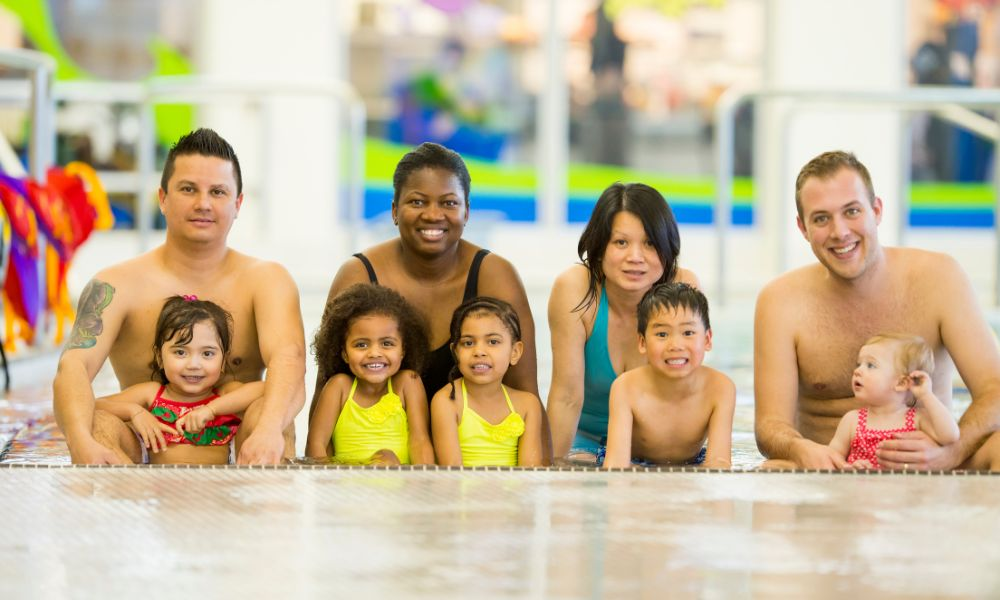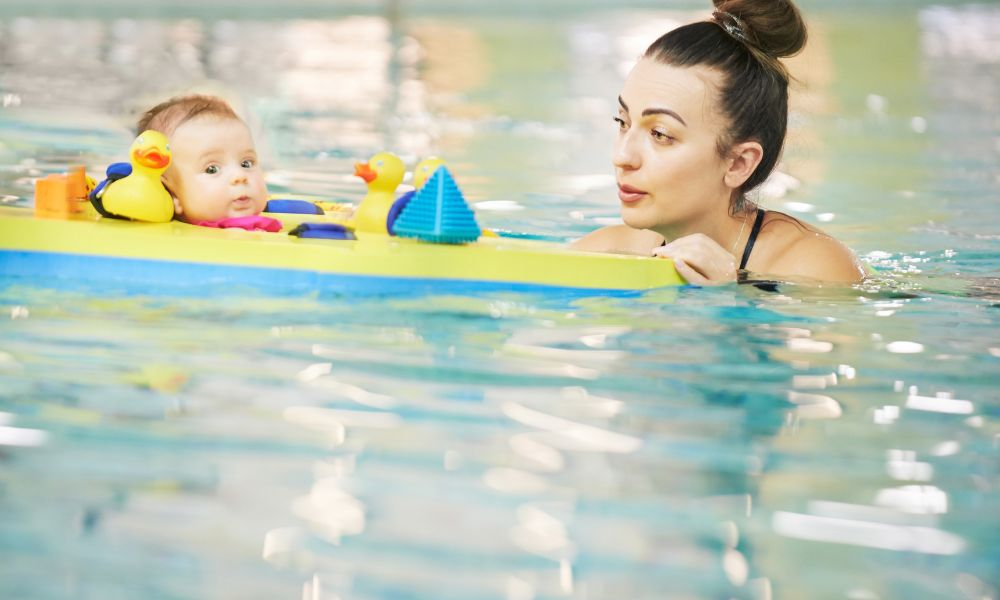Baby swimming
When your baby isn’t enough old to walk, it may seem silly to take infant for baby swimming. Since newborn babies are not born with the ability to swim, there’s a danger of life. The short answer is—No, baby cannot swim!
Mostly, newborns are not enough strong to hold their breath or keep their head above and float above the water’s surface themselves. They all show progress at certain age like they start crawling and walking at different levels.
Babies and swimming
If you have decided to start baby swim lessons that’s great fun for you both. But you must learn safety skills around water with infant, it keeps them safe and fun. Even the youngest babies could go into a pool if they follow safety rules advice.
How Do You Know Baby Can Swim?
Factually, it’s untrue that infants can swim; however, they do have two reflexes which may trick anyone thinking that infant can swim into swimming pool,
Babies show two reflexes—the first one is diving reflex, when your baby goes underwater, he can naturally hold his breath. This reflex is remarkable in babies who are two to three months old, and you will not see it once the baby is older than 6 months.
Another refllex is,when you place your baby stomach-side down in water, infant automatically starts moving arms just like he know how to swim! This reflex also fades away after six months of age. Both of these reflexes may show that newborns can swim, but do not get the wrong idea.
When Can I Start Infant Swim?
Newborns need proper safety and their parents to begin learning movement in the water after 2 months of age. You can start by slowly helping your baby practice floating and gliding, with the help of swimming tube in the bathtub.
Little one around 6 months of age can start taking swim lesson that will introduce them to the world of water, including back float, rollover, freestyling and other swim lessons. It is beautiful to see how competent babies are as the way they learn new skills, have a significant effect on their overall development as they keep growing older.
Where can my baby swim?
I recommend getting your newborn comfortable at bath time. It doesn’t need them to go underwater. For about 2 months you can put it in the heated swimming pool. Those who shiver can be taken to the nearest toilet or wrapped in towels. A child who is less than twelve months of age should not be kept in pool. 30 mins. If you take your baby in a river from one year to another it will help them stay cool.
Safety precautions
Water poses a huge risk for young children. A baby could drown in 5 cm. Always keep the kids away from water. You should learn resuscitation in the case of babies before swimming. The first step will be learning safety skills and first aid. Whenever you have swimming pools you should ensure that they are covered in netting as per Australian standards. The rubber rings can slip out and make a baby’s head dive into the ocean. In water where a baby is not treated well, bacteria may cause infection. Keep them away from swallowing the water.
Can my baby start swimming?
The babies are born without swimming. Most babies like water but reflexes mean they can perform basic swim strokes. When you get a baby in the bathtub, you get water immediately. Nevertheless, they can’t regulate temperatures as adults, so ensure they don’t go cold. Babies are also susceptible to infections when drinking a drink. So, it should be best to start taking the child swimming at around the age of two months. You can go swimming with babies when the vaccinations are not effective yet.
Can a newborn baby swim?
Babies begin swimming from age 1, although they will learn to swim until the age of 4 years.
About swimming lessons
Swim classes for children help you introduce your child to the water and teach them how to swim safely while they’re still young. Swimming lessons for babies start in the first week of age. Typically classes have a few parents and babies who play with the fun and learning methods. Find swim school classes around your region by calling your neighborhood pool.
Safety precautions
Water poses a huge risk for young children. A baby could drown in 5 cm. Always keep the kids away from water. You should learn resuscitation in the case of babies before swimming. The first step will be learning first aid. Whenever you have swimming pools you should ensure that they are covered in netting as per Australian standards. The rubber rings can slip out and make a baby’s head dive into the ocean. In water where a baby is not treated well, bacteria may cause infection. Keep them away from swallowing the water.
Is Swimming Beneficial for Newborns?
Swimming is the ideal exercise for children, and it has a wide range of benefits for babies. However, newborns can begin with smimming and floating after a certain age.
You can start swimming lessons them around 6 months of age, and with the help of Reusable swim Diaper, and Diaper Waterproof Swim, they will be able to learn baby float and many different movements easily.
Swimming promotes muscle development and control in babies at a younger age. It will help strengthen your little one’s heart, lungs, brain and blood vessels.
Along with building muscles, spending time in the pool can help your baby improve their balances and coordination to move those little legs and arms together.
Children go to the pool and interact with one another and begin to learn new things, and to function in groups. They learn new skills and this boosts up their self esteem pretty quickly.
Babies burn a lot of calories while swimming and this improves their sleeping pattern as well; the extra exercise will help make your baby sleepier.
Safety Tips for Baby Swimming
Newborns and infants are sensitive and physically weak, and they should never be left alone around any water pool, fountain or bathtub. If left alone, there’s a threat of drowning because a newborn can drown in one or two inches of water also.
Infants do not have enough control over their muscles and neck, which makes it highly risky, to let them stay alone in water. A tiny fraction of water can be enough to cover a baby’s mouth and nose, making it difficult for them to breathe.
Any parent or an adult should always be close enough to the babies all the time, whenever they enjoy their pool time. Here are some important safety tips for baby swimming:
- Always make sure that your child is close to you or is being supervised by an adult all the time.
- Follow all the safety rules around the baby swimming pool like “no pushing and running” and “never let swim alone.”
- No drinking, no phone or any distraction while keeping an eye on children swimming, supervise carefully.
- Check the water temperature before placing the baby in the bathtub, too hot water can quickly cause serious burns.
- Ensure there is no switchboard, in the bathroom, around the baby during swim lesson.
What Accessories do You Need for Infant Swimming?
Below is the best swim gear list suggested by swim instructors:-
- Pampers Swim Diapers
- Swim Diaper Cover
- Huggies Best disposable swim diapers
- Swimming wetsuit for babies
- The Best rash guard for baby
- Life Jackets for babies
- Swim Goggles for baby
- Baby swimming toys for baby
- Baby Swimming Pool
You will also need swimming clothes for baby like a towel, nappy bag, change mat, water bottle, snacks pack, etc.
When can you take your baby for swimming programs?
According to experts, you can start taking your child to parent-child swim lessons as early as age 1.It’s very important to know that infants and toddlers younger than 12 months aren’t able to raise their heads above the water to breathe, that’s why parents should always be close to their child for supervision.
Infant Education for Early swim lessons may help your baby get over any fears, of being in the water, and can get on their own comfort level. Moreover, swimming is also an amazing opportunity to make a good bonding with your little one by spending lots of time learning together in the pool.
Should your baby wear a diaper while swimming?
Yes, there are always diapers available specially designed for swimming and water play for children. Your baby must wear a swim diaper or swim pants in the pool.
Don’t put regular cloth diapers on your child, as the cloth diapers soak up water and become heavy. Plus, leaking is inevitable.
You should check and change the diaper more frequently to avoid any germs or infection issues that can affect your child.
Swim Lessons-Things to keep in mind while baby swim
Here are some things you must lock up in your mind before you let young children in the water. It can be really risky to let your child in the water without any safety skills, supervision and with a little knowledge of baby swimming lessons.
-
Signs of drowning
As long as you’re taking all the necessary precautions and water safety, infant swim can be perfectly safe. You must protect and keep an eye on your baby all the time in the pool.
If you make any mistakes, there can be a lot of risk for children who are learning swimming lessons. Here are some signs that indicate a person is in danger of drowning include:
- Trying to swim or trying to roll over
- Head is low in the water, and mouth is at water level
- Head is tilted back and mouth is open
- Eyes are glassy or closed
These signs work for both children and adults, make sure you take necessary action if notice anything risky.
-
Signs of baby distress:
If your baby starts shivering or seems to be experiencing muscle cramps, immediatly remove them from water immediately. Children can body temperature more quickly in water compared to land.
Parent must check the water temperature, before letting baby in the pool or bathtub. Babies prefer warmer temperatures. After getting them out of the pool, cover them with a warm cloth as little air might feel cooler to the baby’s skin.
-
Test the water temperature by yourself:
Hot temperatures can be very dangerous for babies’ skin. It is advised water safety and water temperatures for children should range between 82 degrees and 86 degrees fahrenheit, and babies should not enter hot tubs with temperatures exceeding 100 degrees.
Although warm water can make pools more comfortable for babies, excessive temperatures can lead to poor physical reactions. Parents should watch their babies carefully for signs of illness or discomfort in warm pool water.
Why is it good for babies to swim?
Swimming classes are working on strengthening muscles in the chest, shoulders, limb and thigh. The bounce in the water stimulates a vestibulum and help with balancing the body.
Bottom Line
Can infant swim? No matter how impressive swimming reflexes babies show, newborns cannot swim until a certain age. You can begin swim lesson, once they have better control over their muscles, body, and movement.
Can your baby swim? If yes, feel welcome to let us know about baby swimming lessons you used to teach your child. in the comment section below. Share the knowledge and experience!




